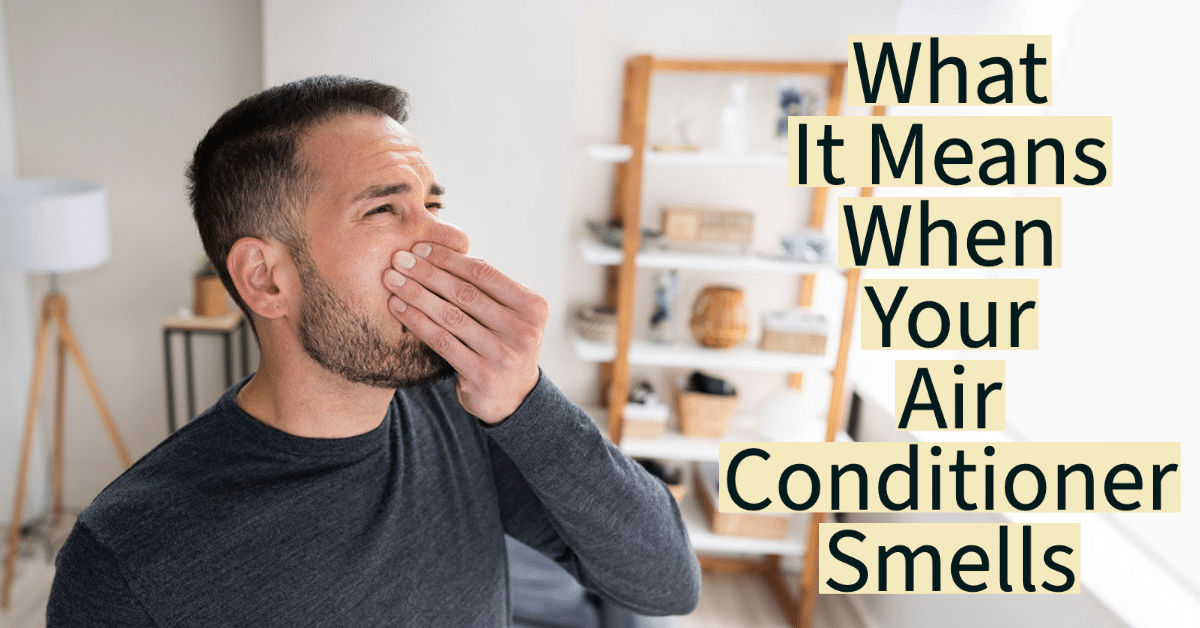Author: Jeff O'Hara
Switching on your air conditioner should not become a “blame the dog” moment.
Many things in our homes generate smells. Food, pets, and people have their own scents, and as these various organic by-products waft through the air, we rely on our HVAC filters to trap most of them. If we keep up with regular AC maintenance and air filter changes, most homeowners can look forward to twelve to fifteen years of loyal, stink-free service.
With that said, when smells linger around our homes that you can’t blame on any living occupants, we need to look at our appliances for a cause. Here’s a quick rundown of the various aromas that can be traced back to HVAC systems, what each one might mean, and how you can eliminate them.
Is Something Burning?
Most common when firing up the furnace for the first time after a long period of disuse, a mild burning smell is usually from dust built up on the heat exchanger. If the scent isn’t overpowering and seems to dissipate as you continue to run the furnace, this is perfectly normal. If the smell of burning dust continues, look at your HVAC system’s air filters, as it may be time for a swap.
Other burning smells can emanate from an HVAC system, usually caused by dried-out and aging electrical wires or failing solder joints on circuit boards. If the burning smells are ever accompanied by visible smoke, shut the system down and call a professional HVAC repair company. Plastic and rubber have a distinctive petroleum-like smell when broken down by heat, so they’re easy to identify. Be sure to let your HVAC technician know about any burning smells and point them in the direction of the odor.
Smells Like Rotten Eggs.
If you notice the smell of rotten eggs when your furnace is operating, you might assume that you have a gas leak. If you suspect a gas leak anywhere in your home, the smartest thing you can do is get everyone out of the house –including yourself—and then call your natural gas provider. It is always best to err on the side of caution when any questions about the safety of your home’s gas appliances arise.
Another possible reason for a rotten egg smell coming from your air conditioner or heater could be a deceased animal. Critters love warm places they can raise a family, and your attic provides the perfect warm and safe place they can move right into and get cozy. Mice, rats, squirrels, and even raccoons are small enough to fit into an HVAC duct, either by entering through the air handler or nibbling their way into flexible ductwork.
While they’re hanging out in the duct, they’re certainly leaving evidence of their presence behind as they sleep, and eat their meals, all while urinating and defecating.
Some unfortunate creatures that find their way into an HVAC system can’t seem to be able to find the way out, so they end up dying in the ductwork. There are no adequate words to describe the horrible stink a dead rodent can produce, but you’re probably not going to want to hang out at home until the body can be removed.
Dirty Sock Syndrome (DSS)
While this is something you might expect to be an affliction of a teenager’s bedroom, Dirty Sock Syndrome (DSS) affects the entire house and is caused by moisture in the air conditioner. We live in an area of the country that is prone to long stretches of oppressive heat and humidity during the summer months, and we rely on our AC units to remove that humidity from our indoor air. All that moisture must go somewhere, and most of it makes it to the evaporator coil, where it is drained into the outdoor drain pan and routed away from the home.
When HVAC systems aren’t adequately maintained in Houston, layers of soggy dirt build up on evaporator coils, allowing mildew and mold to spore and be drawn indoors. Dirty sock syndrome will probably make an appearance when you turn the AC on for the first hot day of the year, and it’s normal. Should that moldy, musty smell continue to hang around the house for more than a day, you should schedule an HVAC maintenance service to make everything is draining properly.
HVAC Smells Like an Overheated Car Engine
Everyone knows that sweet yet sickly smell of automotive antifreeze, and while Freon is an odorless gas, it does have a detectable odor in liquid form. Refrigerant leaks most commonly occur after several years of use and can cause significantly diminished performance in your AC unit. When Freon is leaking from your AC system, you’ll probably notice the warm air blowing from your vents long before you smell the refrigerant.
The older your AC unit, the older the refrigerant is inside of it. The original formulation of Freon was phased out beginning in the late 2000s, and the deadline for its use to be stopped was in January 2020. Even though the current formulation of liquid refrigerant most used is known in the trades as Puron (R-410A) but is still usually referred to as Freon. Refrigerant leaks are not just harmful to your air conditioner; they are also bad for the environment.
The Nick’s Air Conditioning team of HVAC experts is standing by to provide you with fast and efficient residential or commercial maintenance, repairs, or installations. Call our office today and ask about Nick’s VIP maintenance plan, which can save you money both on your energy bills and future repair bills. If your HVAC system is coming off a bit funky, give Nick’s Air Conditioning a call to set up an appointment with one of our techs.Call Nick’s Today; We’re on the Way.


